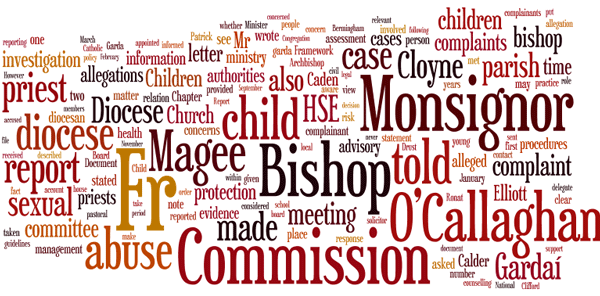Irish Times
July 13, 2011
http://www.irishtimes.com/newspaper/breaking/2011/0713/breaking6.html
 |
| A wordle graphic based on the frequency with which each of the words are mentioned in the Cloyne Report. |
The Vatican was “entirely unhelpful” to any bishop who wanted to implement procedures for dealing with allegations of child sexual abuse in the Irish Catholic Church, a report has found.
The Commission of Investigation Report into the Catholic Diocese of Cloyne states that a decision by the Vatican to brand a framework document on child sexual abuse, agreed by the Irish Bishops Conference in 1996, as “not an official document” effectively gave individual Irish bishops “the freedom to ignore” the guidelines.
The Vatican response “can only be described as unsupportive especially in relation to the civil authorities,” the commission said in its 341 page report.
The effect of this was “to strengthen the position of those who dissented from the official stated Irish Church policy”, according to the report, which examines allegations made against 19 priests between 1996 and 2009.
The commission says the response of the diocese was “inadequate and inappropriate” and that the primary responsibility for the failure to implement the agreed child sexual abuse procedures lies with then Bishop of Cloyne John Magee, who resigned in March 2010.
“It is a remarkable fact that Bishop Magee took little or no active interest in the management of clerical child sexual abuse cases until 2008, 12 years after the framework document was adopted,” the report says.
“It became clear during the course of this investigation that Bishop Magee had, to a certain extent, detached himself from the day to day management of child sexual abuse cases. Bishop Magee was the head of the diocese and cannot avoid his responsibility by blaming subordinates who he wholly failed to supervise.”
It says Dr Magee wrongly told the Government and the HSE that the Cloyne Diocese was reporting all allegations of clerical child sexual abuse to the authorities. It also said he deliberately misled people by creating two different accounts of a meeting with a priest accused of abuse.
The inquiry, led by Judge Yvonne Murphy, said the fact that some child sexual abuse allegations were not reported to gardai was the diocese’s “greatest failure”.
There were 15 cases between 1996 and 2005 which “very clearly” should have been reported by the diocese. Nine of the cases were not reported.
“The most serious lapse was the failure to report the two cases in which the alleged victims were minors at the time of the complaint was made,” the commission said.
The diocese also failed to report any complaints to health authorities between 1996 and 2008, as agreed under the framework document, and it failed to appoint people to provide support to victims or perpetrators of child sexual abuse.
“Given the diocese’s knowledge of clerical sexual abuse and its effects on complainants it was wrong of the diocese not to put in place a proper support system for complainants,” the commission says.
Minster for Justice Alan Shatter said today he plans to introduce legislation to make it a criminal offence not to report the sexual abuse of a child or vulnerable adult.
Speaking in the wake of the publication of the Cloyne report, Mr Shatter also expressed the State’s “sorrow and profound apology” for any failings on its part in relation to the revelations of the report.
The report was commissioned in January 2009 by then minister for children Barry Andrews after the public outcry which followed publication in December 2008 of a review of child protection practices in Cloyne by the Catholic Church’s own child protection watchdog, the National Board for Safeguarding Children.
The commission was asked to investigate the handling of clerical child sex abuse allegations in Cloyne by church and State authorities between January 1st, 1996 - when the church’s first published guidelines, its Framework Document, came into play - and February 1st, 2009.
It was approved for publication at the Cabinet meeting yesterday and was formally published this afternoon by Mr Shatter and Minister for Children Frances Fitzgerald.
Findings against one priest are being withheld as he is currently before the courts.
The report says the Vatican approach “gave comfort and support” to individuals such as Monsignor Denis O’Callaghan, who handled child sexual abuse policy in the Diocese of Cloyne for many years without supervision.
Mgr O’Callaghan failed to understand that the requirement to report was for the protection of other children, the commission said, and he said he did not notify of complaints against deceased priests until May 2003.
Mgr O'Callaghan told the commission: “I regret now that I did not intervene to counter the choice of the legal route when just settlements should have been made earlier with survivors” “I regret also that I tended to show favour to accused priests vis-a-vis complaints in some cases."
The report is largely complimentary about the role of gardai but does raise concerns about its approach in three cases.
In one, an investigation was “clearly not commenced”. In a second case, a statement that was taken from a young man by a garda who was due to retire was put in a drawer and forgotten about. In a third case, the evidence given to the commission by a garda differed from statements he had made to prior Garda investigations.
The commission said the response of health authorities was “adequate” but that “the primary responsibility for the protection of children rests with the State and it is not convinced the State’s laws and guidelines are sufficiently strong and clear for this task”.
The report also examines how an allegation against Dr Magee from 2008 was dealt with. He is alleged to have embraced an 18-year-old youth and kissed him on the forehead, which was deemed to be inappropriate but not reportable behaviour.
Any original material on these pages is copyright © BishopAccountability.org 2004. Reproduce freely with attribution.